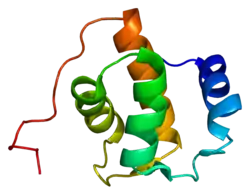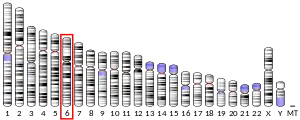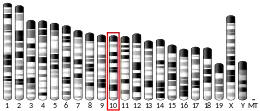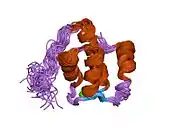REPS1
RalBP1-associated Eps domain-containing protein 1 is a protein that in humans is encoded by the REPS1 gene.[5]
| REPS1 | |||||||||||||||||||||||||
|---|---|---|---|---|---|---|---|---|---|---|---|---|---|---|---|---|---|---|---|---|---|---|---|---|---|
 | |||||||||||||||||||||||||
| Identifiers | |||||||||||||||||||||||||
| Aliases | REPS1, RALBP1, RALBP1 associated Eps domain containing 1, NBIA7 | ||||||||||||||||||||||||
| External IDs | OMIM: 614825 MGI: 1196373 HomoloGene: 7515 GeneCards: REPS1 | ||||||||||||||||||||||||
| |||||||||||||||||||||||||
| |||||||||||||||||||||||||
| |||||||||||||||||||||||||
| Orthologs | |||||||||||||||||||||||||
| Species | Human | Mouse | |||||||||||||||||||||||
| Entrez | |||||||||||||||||||||||||
| Ensembl | |||||||||||||||||||||||||
| UniProt | |||||||||||||||||||||||||
| RefSeq (mRNA) | |||||||||||||||||||||||||
| RefSeq (protein) | |||||||||||||||||||||||||
| Location (UCSC) | Chr 6: 138.9 – 138.99 Mb | Chr 10: 18.06 – 18.13 Mb | |||||||||||||||||||||||
| PubMed search | [3] | [4] | |||||||||||||||||||||||
| Wikidata | |||||||||||||||||||||||||
| |||||||||||||||||||||||||
References
- GRCh38: Ensembl release 89: ENSG00000135597 - Ensembl, May 2017
- GRCm38: Ensembl release 89: ENSMUSG00000019854 - Ensembl, May 2017
- "Human PubMed Reference:". National Center for Biotechnology Information, U.S. National Library of Medicine.
- "Mouse PubMed Reference:". National Center for Biotechnology Information, U.S. National Library of Medicine.
- "Entrez Gene: REPS1 RALBP1 associated Eps domain containing 1".
Further reading
- Cantor SB, Urano T, Feig LA (1995). "Identification and characterization of Ral-binding protein 1, a potential downstream target of Ral GTPases". Mol. Cell. Biol. 15 (8): 4578–84. doi:10.1128/mcb.15.8.4578. PMC 230698. PMID 7623849.
- Yamaguchi A, Urano T, Goi T, Feig LA (1998). "An Eps homology (EH) domain protein that binds to the Ral-GTPase target, RalBP1". J. Biol. Chem. 272 (50): 31230–4. doi:10.1074/jbc.272.50.31230. PMID 9395447.
- Ikeda M, Ishida O, Hinoi T, et al. (1998). "Identification and characterization of a novel protein interacting with Ral-binding protein 1, a putative effector protein of Ral". J. Biol. Chem. 273 (2): 814–21. doi:10.1074/jbc.273.2.814. PMID 9422736.
- Xu J, Zhou Z, Zeng L, et al. (2002). "Cloning, expression and characterization of a novel human REPS1 gene". Biochim. Biophys. Acta. 1522 (2): 118–21. doi:10.1016/s0167-4781(01)00310-4. PMID 11750063.
- Cullis DN, Philip B, Baleja JD, Feig LA (2003). "Rab11-FIP2, an adaptor protein connecting cellular components involved in internalization and recycling of epidermal growth factor receptors". J. Biol. Chem. 277 (51): 49158–66. doi:10.1074/jbc.M206316200. PMID 12364336.
- Strausberg RL, Feingold EA, Grouse LH, et al. (2003). "Generation and initial analysis of more than 15,000 full-length human and mouse cDNA sequences". Proc. Natl. Acad. Sci. U.S.A. 99 (26): 16899–903. doi:10.1073/pnas.242603899. PMC 139241. PMID 12477932.
- Hu Y, Mivechi NF (2003). "HSF-1 interacts with Ral-binding protein 1 in a stress-responsive, multiprotein complex with HSP90 in vivo". J. Biol. Chem. 278 (19): 17299–306. doi:10.1074/jbc.M300788200. PMID 12621024.
- Gerhard DS, Wagner L, Feingold EA, et al. (2004). "The Status, Quality, and Expansion of the NIH Full-Length cDNA Project: The Mammalian Gene Collection (MGC)". Genome Res. 14 (10B): 2121–7. doi:10.1101/gr.2596504. PMC 528928. PMID 15489334.
- Rual JF, Venkatesan K, Hao T, et al. (2005). "Towards a proteome-scale map of the human protein-protein interaction network". Nature. 437 (7062): 1173–8. Bibcode:2005Natur.437.1173R. doi:10.1038/nature04209. PMID 16189514. S2CID 4427026.
- Olsen JV, Blagoev B, Gnad F, et al. (2006). "Global, in vivo, and site-specific phosphorylation dynamics in signaling networks". Cell. 127 (3): 635–48. doi:10.1016/j.cell.2006.09.026. PMID 17081983. S2CID 7827573.
- Drake KJ, Singhal J, Yadav S, et al. (2007). "RALBP1/RLIP76 mediates multidrug resistance". Int. J. Oncol. 30 (1): 139–44. doi:10.3892/ijo.30.1.139. PMID 17143522.
- Singhal SS, Singhal J, Nair MP, et al. (2007). "Doxorubicin transport by RALBP1 and ABCG2 in lung and breast cancer". Int. J. Oncol. 30 (3): 717–25. doi:10.3892/ijo.30.3.717. PMID 17273774.
This article is issued from Wikipedia. The text is licensed under Creative Commons - Attribution - Sharealike. Additional terms may apply for the media files.




